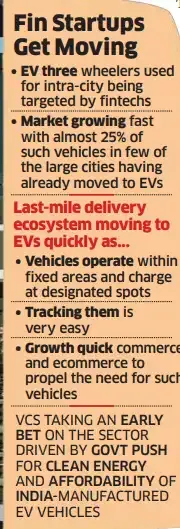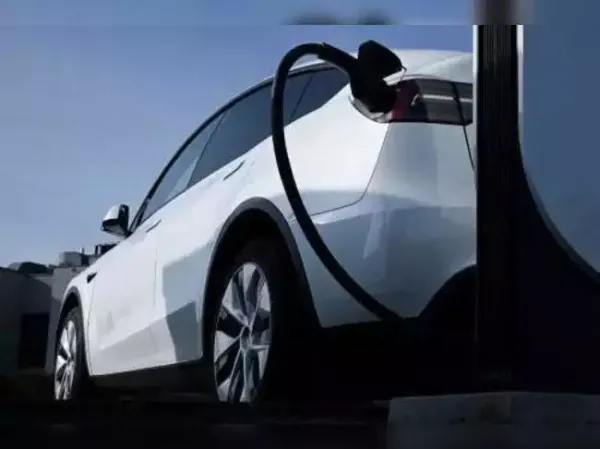At a time when consumer lending startups are struggling to find stable ground, fintech firms focused on financing electric commercial vehicles are seeking to accelerate growth.
Fintechs like Revfin, Vidyut Tech, Turno and Ascend Capital see opportunities to capture market share given traditional non-banking finance companies and banks are not yet active in funding electric vehicles being used for commercial purposes.
Electric three-wheelers used for intracity commercial deliveries and logistics are a "sweet spot" being targeted by these fintechs, said Harsh Gupta, principal at Flourish Ventures. "...this market is growing fast with almost 25% of such vehicles in a few of the large cities having already moved to EVs."
Also Read: ETtech in-depth: Ride-hailing on a rollercoaster ride with sharp twists, turns
Flourish recently invested $2.5 million in VidyutTech, a Bengaluru-based EV financing startup. Gupta believes there is a short window for fintechs to build expertise in the sector before traditional financial institutions sharpen their focus on this segment.

While traditional lenders are mostly financing purchase of passenger vehicles by underwriting the customer, fintech startups are trying to underwrite these battery-run vehicles through innovative means.
New models
VidyutTech operates as a pay-as-you-use service for the battery, thereby reducing the upfront EV purchase cost for the consumer by 20-25%.
"For any EV, the cost difference with a combustion engine vehicle is the price of the battery. If a customer pays for the battery through instalments just like fuel costs, it reduces the financial burden on a commercial vehicle owner," said a senior industry executive who has tracked the sector closely. Founded in 2021, VidyutTech has raised $17 million over multiple funding rounds.
Revfin, another major player in this space, initially funded e-rickshaws mostly powered by lead-acid batteries. Now the Gurugram-based startup is supporting three-wheelers that use lithium-ion batteries.
"We get around 40-45% of our business from fleet owners. The vehicles are owned by us but leased to these platforms; this helps us track their usage and monitor repayments effectively as well," said Revfin chief executive Sameer Agarwal.
Revfin, which has raised around $30 million, is looking for another $15-20 million and is in talks with investors.
The company has its own NBFC through which it lends to customers.
Fintechs like Revfin, Vidyut Tech, Turno and Ascend Capital see opportunities to capture market share given traditional non-banking finance companies and banks are not yet active in funding electric vehicles being used for commercial purposes.
Electric three-wheelers used for intracity commercial deliveries and logistics are a "sweet spot" being targeted by these fintechs, said Harsh Gupta, principal at Flourish Ventures. "...this market is growing fast with almost 25% of such vehicles in a few of the large cities having already moved to EVs."
Also Read: ETtech in-depth: Ride-hailing on a rollercoaster ride with sharp twists, turns
Flourish recently invested $2.5 million in VidyutTech, a Bengaluru-based EV financing startup. Gupta believes there is a short window for fintechs to build expertise in the sector before traditional financial institutions sharpen their focus on this segment.

While traditional lenders are mostly financing purchase of passenger vehicles by underwriting the customer, fintech startups are trying to underwrite these battery-run vehicles through innovative means.
New models
VidyutTech operates as a pay-as-you-use service for the battery, thereby reducing the upfront EV purchase cost for the consumer by 20-25%.
"For any EV, the cost difference with a combustion engine vehicle is the price of the battery. If a customer pays for the battery through instalments just like fuel costs, it reduces the financial burden on a commercial vehicle owner," said a senior industry executive who has tracked the sector closely. Founded in 2021, VidyutTech has raised $17 million over multiple funding rounds.
Revfin, another major player in this space, initially funded e-rickshaws mostly powered by lead-acid batteries. Now the Gurugram-based startup is supporting three-wheelers that use lithium-ion batteries.
"We get around 40-45% of our business from fleet owners. The vehicles are owned by us but leased to these platforms; this helps us track their usage and monitor repayments effectively as well," said Revfin chief executive Sameer Agarwal.
Revfin, which has raised around $30 million, is looking for another $15-20 million and is in talks with investors.
The company has its own NBFC through which it lends to customers.








